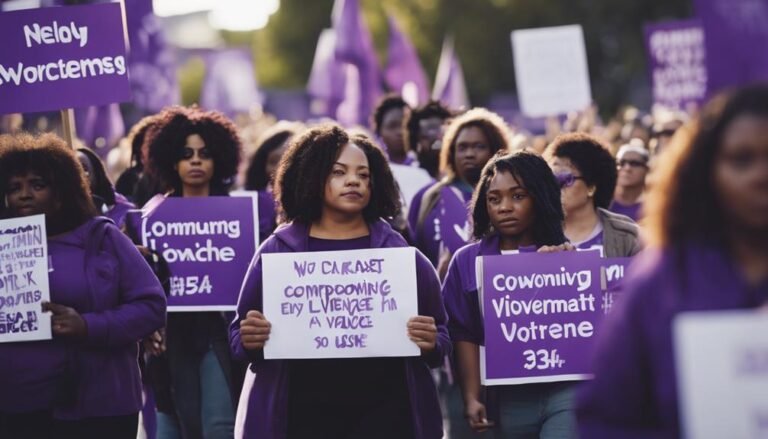Breaking free from an abusive relationship, Laura bravely ended her trauma bond, initiating a journey of healing and self-discovery. Recognizing emotional ties, overcoming dependency, celebrating milestones, and embracing independence were key milestones in her path towards growth. Laura’s story highlights the importance of nurturing self-growth and reclaiming personal power after leaving toxicity behind. The year she broke her trauma bond was just the beginning of a profound transformation towards healing and empowerment. Explore the steps she took to reclaim her autonomy and rebuild her life after leaving an abusive relationship.
Key Takeaways
- Recognizing emotional ties in abuse
- Identifying triggers and breaking patterns
- Challenging distorted beliefs about abuser
- Embracing independence and autonomy
- Celebrating healing milestones and growth
Recognizing Trauma Bonding
Recognizing trauma bonding is vital in understanding the complex emotional ties that can keep individuals in abusive relationships despite the harm inflicted upon them. Identifying triggers that contribute to this bond, breaking patterns of dependency, and understanding the dynamics at play are essential steps in recognizing and addressing trauma bonding.
It involves seeking closure from the cycle of abuse, challenging distorted beliefs about the abuser, and embracing independence. By acknowledging the impact of trauma bonding, individuals can begin to break free from the emotional chains that bind them to harmful relationships.
Celebrating milestones in healing, picking up hobbies for self-empowerment, and experiencing a range of emotions post-relationship are all part of the journey towards breaking the trauma bond and moving towards a healthier future.
Overcoming Dependency
Breaking free from dependency on an abusive partner is an essential step towards reclaiming one’s autonomy and well-being. Building resilience is key in overcoming the emotional ties that keep individuals trapped in harmful relationships. It involves developing the inner strength to withstand challenges and setbacks while moving towards a healthier future.
By focusing on developing autonomy, survivors can regain control over their lives and make decisions that align with their values and goals. This process may include setting boundaries, rediscovering personal interests, and seeking support from trusted individuals or professionals. Remember, it’s a journey, and each step taken towards independence is a victory in itself.
With time and effort, healing and growth are achievable.
Celebrating Healing Milestones
One may find immense value in acknowledging and celebrating the milestones achieved on their healing journey after leaving an abusive relationship. Reflecting on the growth and empowerment journey can be a powerful way to recognize the healing progress made.
Each milestone reached signifies a step towards reclaiming self-worth and independence. Celebrating these achievements, whether big or small, can provide validation and encouragement in overcoming past trauma.
It’s essential to honor the strength and resilience it took to start on a path towards healing after breaking free from an abusive situation. By acknowledging these milestones, individuals can reinforce a positive self-image and cultivate a sense of pride in their progress.
Embracing the journey of healing and celebrating each milestone is an essential part of the recovery process.
Embracing Independence
Embracing independence after leaving an abusive relationship is an essential step towards reclaiming personal power and autonomy. Building confidence plays an important role in this journey towards self-discovery and healing. It involves recognizing one’s own strength, worth, and capabilities, which may have been undermined during the abusive relationship.
Embracing freedom allows survivors to explore their interests, make choices for themselves, and establish boundaries that honor their well-being. It’s a process of rediscovering individuality and regaining control over one’s life.
Nurturing Self-Growth

Nurturing self-growth involves actively investing in personal development and well-being following the challenges of leaving an abusive relationship. It’s a journey of self-discovery and personal empowerment, where inner strength is cultivated through emotional healing.
By engaging in activities that promote self-care and self-awareness, individuals can begin to rebuild their sense of self-worth and establish healthy boundaries. Seeking therapy or counseling can aid in processing past trauma and developing coping mechanisms for future relationships.
Embracing newfound freedom and independence allows for the exploration of interests and passions that may have been suppressed during the abusive relationship. Through advocacy for self-love and healthy relationships, survivors can continue on their path of healing and growth.
Frequently Asked Questions
How Can I Rebuild Trust in Myself After Leaving an Abusive Relationship?
To rebuild trust in oneself after leaving an abusive relationship, one can focus on rebuilding confidence through self-care, seeking therapy to process emotions, and surrounding oneself with supportive individuals who validate and empower personal growth.
Is It Normal to Feel Guilty for Breaking the Trauma Bond?
Feeling guilty for breaking the trauma bond is common. It’s important to address these emotions by seeking therapy and support. Remember, prioritizing self-care and healing is vital in the journey towards recovery and rebuilding trust in oneself.
What Are Some Practical Ways to Maintain Independence Post-Abuse?
Like a butterfly emerging from its cocoon, maintaining independence post-abuse involves setting boundaries like guardian angels, prioritizing self-care as a daily ritual, securing financial independence, and leaning on support systems for strength.
How Can I Cope With the Fear of Falling Back Into the Cycle?
When coping with the fear of falling back into the cycle, individuals can focus on overcoming triggers by identifying patterns, engaging in self-care, and seeking support from trusted individuals or support groups.
Can Trauma Bonding Affect Future Relationships?
Trauma bonding can impact future relationships by creating trust issues and affecting emotional boundaries. It’s important to acknowledge these challenges, seek therapy for healing, and establish healthy boundaries to cultivate fulfilling and supportive relationships moving forward.
How can leaving an abusive relationship help in starting a new healthy relationship?
Leaving an abusive relationship is important for both physical and emotional well-being. It allows the individual to heal and rebuild their confidence, making it easier to start a new healthy relationship. Supporting and understanding the tips for living with abuse survivor partner can help create a safe and nurturing environment for their healing.
Conclusion
As she closed the chapter on her abusive relationship, a familiar tune played on the radio – a song she once loved but had associated with pain. Yet, this time, she found herself humming along, feeling a sense of freedom and joy she hadn't felt in years.
It was a simple moment of coincidence, but it symbolized the newfound strength and resilience she'd discovered within herself. And as she drove towards a brighter future, she knew she was finally free.







